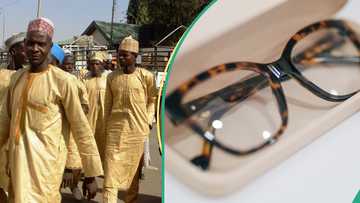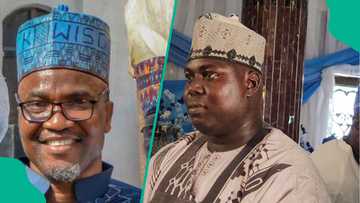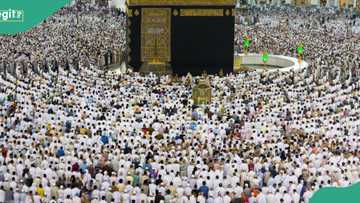Eid al-Adha rules, practices, traditions and regulations
Eid al-Adha, or the Feast of Sacrifice, is an essential Islamic festival. Its rules encompass various aspects, including the proper method of animal sacrifice (Qurbani). Understanding Eid al-Adha rules is crucial for properly honouring the occasion, which commemorates the willingness of Prophet Ibrahim (Abraham) to sacrifice his son as an act of obedience to God.
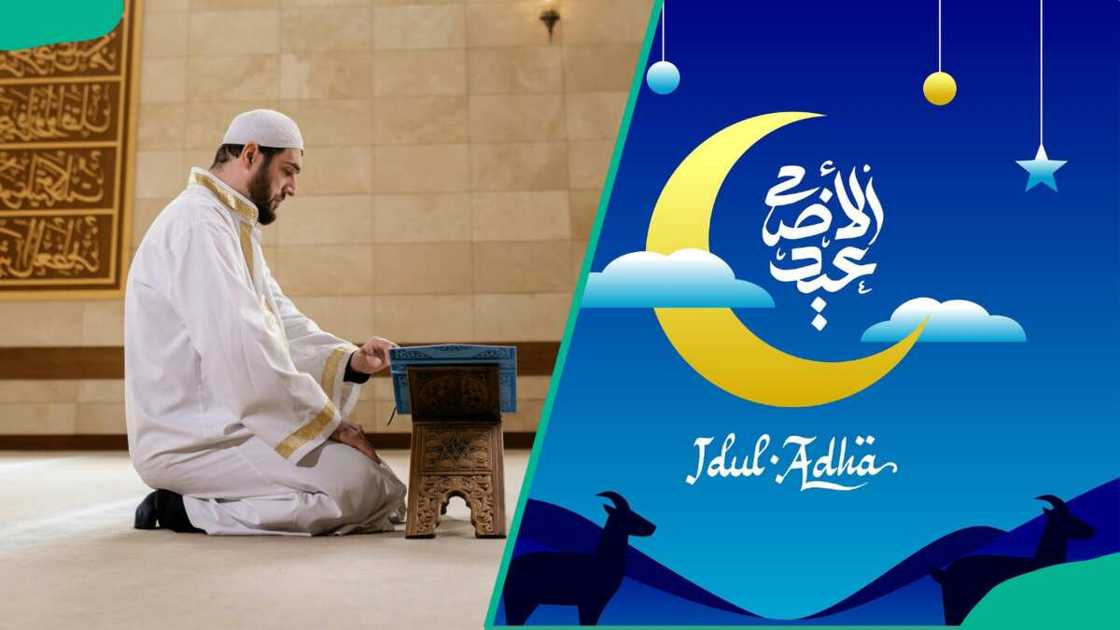
Source: UGC
TABLE OF CONTENTS
- Key takeaways
- Eid al-Adha rules
- What does Eid al-Adha mean?
- What is Eid al-Adha's significance?
- How is Eid al-Adha celebrated?
- What is compulsory on Eid al-Adha?
- What are the rules during Eid?
- When is Eid al-Adha in Nigeria?
Key takeaways
- Eid al-Adha rules emphasise the ritual of sacrificing a halal animal, usually a sheep, goat, cow, or camel, as an act of devotion to God.
- The sacrificed animal's meat is divided into three parts — one for the family, one for relatives and friends, and one for the needy.
- The Qurbani should be performed after the Eid prayer on the 10th, 11th, or 12th of Dhul-Hijjah, following the guidelines of Eid al-Adha rules.
- Muslims begin the celebration with a special Eid prayer performed in congregation, typically at a mosque or open field.
- It is a tradition to wear new or freshly washed clothes, symbolising spiritual and physical purity.

Read also
UTME 2025: Multiple calls surface for JAMB registrar to immediately resign after notable revelation
Eid al-Adha rules
Muslims celebrate Eid al-Adha within the first ten days of Dhu al Hijjah according to the Islamic calendar. For those performing the pilgrimage, Qurbani (sacrificing an animal and distributing its share to family, friends, and the needy) marks the completion of Hajj.
One can also make a donation equivalent to the value of a sacrificial animal. Meanwhile, the rest of the Muslims celebrate Eid al-Adha after Qurbani is accomplished. Learn Eid al-Adha prayer and sacrifice rules and practices below:
What 2 things are done during Eid-ul-Adha?
- Animal Sacrifice (Qurbani): Muslims perform the ritual of sacrificing a halal animal, such as a sheep, goat, cow, or camel, in remembrance of Prophet Ibrahim's willingness to sacrifice his son as an act of obedience to God.
- Eid Prayer: Muslims gather for a special Eid prayer performed in congregation, typically in a mosque or an open area, which includes a sermon (khutbah) followed by a collective prayer.
What time is the Eid prayer?
On the day the moon appears after the completion of the annual Holy Pilgrimage of Hajj, Muslims perform the Eid al-Adha prayer, Takbir, about 15 to 20 minutes after sunrise.
They recite the Takbir at dawn before attending the communal Salat ul-Eid prayers. Since Eid Salah differs from the usual prayers, Muslims are encouraged to make it in Jama’ah (congregation) with fellow Muslims.
What are the rules for Eid al-Adha?
The prayer consists of two rak'ahs (parts), and although it can be conducted at home, it is recommended to be performed in an open space, like a field. These are Islam's general Eid al Adha rules, practices, traditions, and regulations.
- Wake up early and shower in preparation for the festival.
- Wear your best clothes and ensure you smell good (Sunnah of Eid ul-Fitr).
- Make ghusl (the ritual ablution) and say the general Takbir on your way to Eid prayer.
- Eat an odd number of dates before going out to pray.
- It is Sunnah to pray something else before the Eid prayer.
- An Imam will lead the Eid prayer at the mosque or an open space, like a field.
What are the traditions of Eid al-Adha?
- Muslims begin the celebration with a special congregational prayer (Salat al-Eid), typically performed at a mosque or an open field, followed by a sermon (khutbah).
- A key tradition is the ritual sacrifice of a halal animal, such as a sheep, goat, cow, or camel, to honour the story of Prophet Ibrahim's (Abraham's) willingness to sacrifice his son in obedience to God.
- The meat from the sacrificed animal is divided into three parts — one for the family, one for relatives and friends, and one for the less fortunate, promoting charity and community support.
- Muslims wear new or freshly cleaned clothes on Eid al-Adha, symbolising purity and celebration.
- Families gather for festive meals, exchange greetings of "Eid Mubarak," and strengthen bonds with loved ones.
- Beyond the sacrifice, Muslims are encouraged to give additional charity to those in need, embodying the festival’s spirit of compassion.
- Muslims recite the Takbir (Allahu Akbar, Allahu Akbar, La ilaha illallah) starting from the eve of Eid until the final day, expressing praise and gratitude to God.

Read also
Mercy Aigbe, Joke Silva, Odunlade, other legends gather at AMVCA Icon Night, videos from event trend
Is fasting before Eid al-Adha compulsory?
Fasting before Eid al-Adha is recommended but optional. Arafah (or the Day of Arafah) falls just before Eid al-Adha and is believed to atone for sins of the preceding and coming year.

Source: UGC
Eid al-Adha Qurbani rules and practices
After prayers, Muslims prepare to perform Qurbani and have a feast. Monetary Qurbani donations buy sacrificial animals for everyone to enjoy on Eid al-Adha. Below are Eid al-Adha sacrifice rules, practices, traditions, and regulations:
When is Qurbani done?
Qurbani, sacrificing an animal, should be done on the 10th, 11th, and 12th days of Eid al-Adha hajj. The sacrifices should be done as close to the completion of the Eid Salah as possible.
Since sacrifices made before the Eid prayer are not considered Qurbani, animals are purchased a few days before the day of sacrifice. They must also be well-fed and kept in a suitable environment from the day they are bought to the day of sacrifice.
Who should perform Qurbani?
Every able Muslim can perform Qurbani. Additionally, a Muslim can perform Qurbani on behalf of others, such as the dead, but parents should not provide Qurbani on their children’s behalf. The only people exempted from marking the festival with Qurbani are:
- Muslims who do not own 52.5 tolas of silver or wealth of equivalent value.
- Muslims who are not of sound mind.
- Muslims who are yet to reach puberty.
- Muslims who are on travel and are more than the allowed Shar’i distance from their homes or residences. The Shar’i distance is about 40-45 kilometres.
The person offering the Qurbani should own the animal. It should not be stolen or forcefully taken from another person, and an animal chosen for sacrifice cannot be given or sold to another person.
Also, remember not to shave your hair or cut your nails within ten days preceding the day of sacrifice. In the words of the Prophet (SAW):
When you see the new moon of Dhul Hijjah and one of you desires that he offer a sacrifice, let him keep his hair and nails.
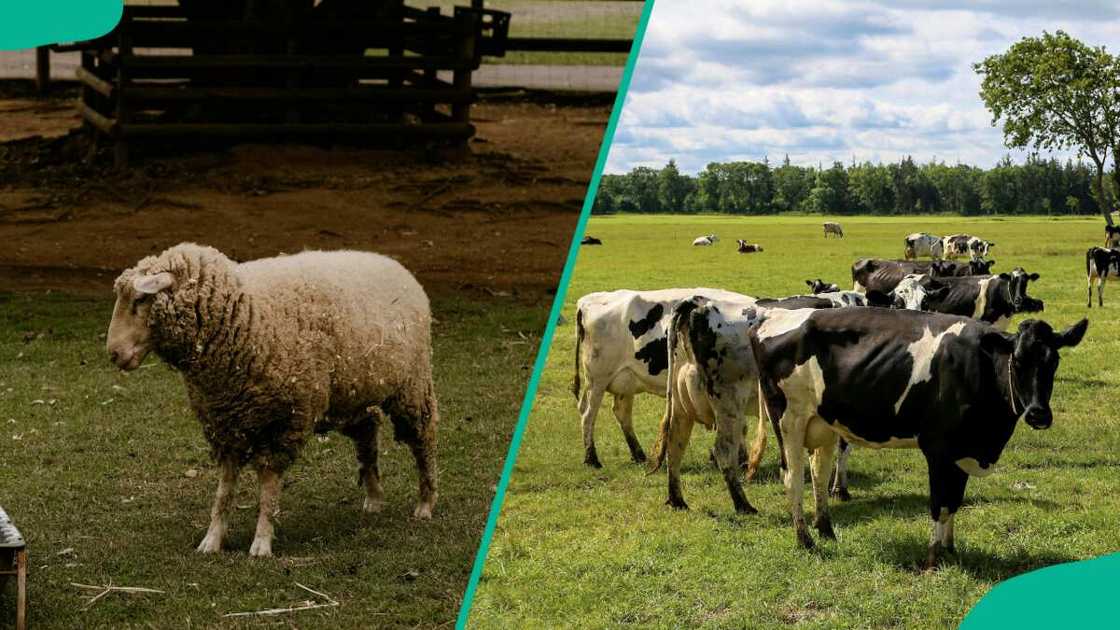
Source: UGC
Which animals are sacrificed for Eid al-Adha?
Both male and female animals can be sacrificed. While it is not compulsory, it is preferable to choose castrated male animals. The sacrificed animal is called uḍḥiyah, and these are the animals that can be sacrificed:
- Goats and sheep – One goat or sheep is adequate for one person and should be at least one year old.
- Buffalos, bulls, or cows – One buffalo, bull, or cow is adequate for Qurbani for seven people and should be at least two years old.
- Camels – One camel is enough Qurbani for seven people and should be at least five years old.
Rules for selecting an animal to be sacrificed
The animals you buy or select for sacrifice during Eid al-Adha should meet specific criteria. Some of these specifications are:
- They must be healthy and free from any disease.
- The animal(s) must not be blind, have one eye, or have lost a third or more of their eyesight.
- The animal(s) should not miss a third or more of their tail or ear since birth or through loss.
- The horns of the animal should not be broken off from their root.
- The animal(s) should not have a lame leg that is weak enough to render it/them unable to walk.
- The animal(s) should not be very thin or lean.
- The animal(s) should be able to walk to the sacrificial place.
- The animal(s) should not be toothless or missing over half their teeth.

Read also
KWAM 1 defends controversial comments about alfas, saying: “U are saying the accusations are true”
Regulations for sacrificing the animal
A Muslim should follow the following practices and traditions when sacrificing an animal during Eid al-Adha:
- Use a sharp knife to avoid causing the animal(s) unnecessary suffering when sacrificing them.
- You should not sharpen the knife in front of the animal(s).
- You should not sacrifice any animal in the presence of another animal.
- An outsourced butcher should not be paid with meat, fat, or anything from the sacrificed animal.
- No sacrificed animal should be skinned until it is completely cold.
The Islamic faith encourages the person offering Qurbani to sacrifice the animal themselves, but you can also outsource the services of a butcher.
Nonetheless, the person offering the Qurbani must be present to witness the animal being killed and recite the words "Bismillahi Allahu Akbar" during the sacrifice.
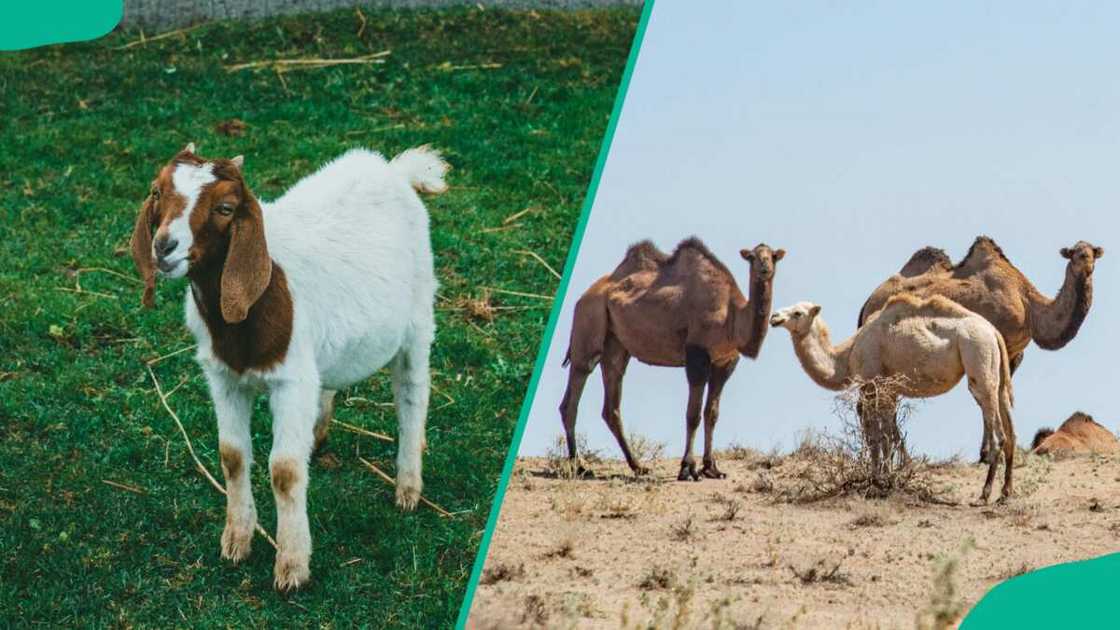
Source: UGC
Regulations for distributing the meat
Eid al-Adha regulations for the distribution of meat are as follows:
- The sacrificed animal should be divided into three equal parts. One part should be given to the family, the second to friends or neighbours, and the third to people in need. Sharing with the poor is not limited to Muslims only. Non-Muslims can also receive the meat.
- When sharing Qurbani with one or multiple partners, divide the meat equally by weight and not by approximation.
- A Muslim can keep the skin of the sacrificed animal for personal use. If the skin is sold, all the proceeds should be donated to the less privileged.
What if you missed Qurbani?
If you missed the festival in the previous years, you make up for your absence by sacrificing extra animals. Calculate the number of years you missed and choose the number of animals you must sacrifice.
One small animal, such as a goat or sheep, is equivalent to one Qurbani share. A larger animal, such as a cow or a camel, equals seven shares and can be split between seven individuals.
Eid al-Adha food
Cooking recipes and dishes prepared on Eid al-Adha differ across nations, depending on family or personal preferences. For example, Southeast Asians use meat to make biryani, Turkish people make kebabs, and Nigerians make traditional dishes. Common meals Nigerians make with Qurbani meat during Eid al-Adha are:
- Egusi soup
- Efo Riro soup
- Jollof rice
- Nkwobi
- Peppered ponmo
- Ogbono soup
- Banga soup
- Pepper soup
- Spicy beef offal
- Nsala soup
- Gbegiri soup
- Afang soup
- Ogbono soup

Source: UGC
What does Eid al-Adha mean?
Eid al-Adha, or the Feast of Sacrifice, is a time for Muslims to thank Allah (God) for blessing them. The three-to-four-day festival marks Qurbani and the Hajj pilgrimage.
What is Eid al-Adha's significance?
The celebration commemorates the sacrifice that Prophet Ibrahim was ready to give to Allah, but a ram was sent for him to sacrifice instead of his son.
How is Eid al-Adha celebrated?
Muslims in Nigeria celebrate Eid al-Adha in style, just like Eid al-Adha Muslims worldwide. Here are some of the things Nigerians do:
- People of all ages dress to impress, and most wear new clothes. Some wear Islamic clothing, while others rock their finest Agbada, stylish Ankara dresses, and other native Nigerian attire.
- The people meet at the mosque to pray and thank Allah for blessing them. They also share Eid Mubarak greetings and exchange gifts (if one can afford this).
- Communal prayers are performed before noon, and animal sacrifice is not permitted until after the prayer has been said.
- After the sacrifice has been performed, Muslims share the meat among themselves and with non-Muslims.
- People prepare the Qurbani meat however they like. Dishes prepared on Eid al-Adha depend on family or personal preferences.

Read also
List of major 2025 prophecies by Adeboye, Apostle Selman, Ayodele, Iginla, other Nigerian pastors
What is compulsory on Eid al-Adha?
One must perform the Eid al-Adha prayer and offer an animal sacrifice afterwards. One can also make an alternative donation equivalent to the animal to be sacrificed.
Sharing the Qurbani donation or everything from the sacrificed animal with family, friends, and the needy is also essential.
What is the ritual of Eid al-Adha?
The primary ritual of Eid al-Adha is the sacrifice of an animal (Qurbani), which commemorates Prophet Ibrahim's (Abraham's) willingness to sacrifice his son in obedience to God's command.
What are the rules during Eid?
Fasting is forbidden on the day of Eid al-Adha, and you must perform a specific prayer called Salat ul-Eid in the morning, anytime after sunrise, and before noon. Most Muslims perform the prayer about 15 to 20 minutes after sunrise.
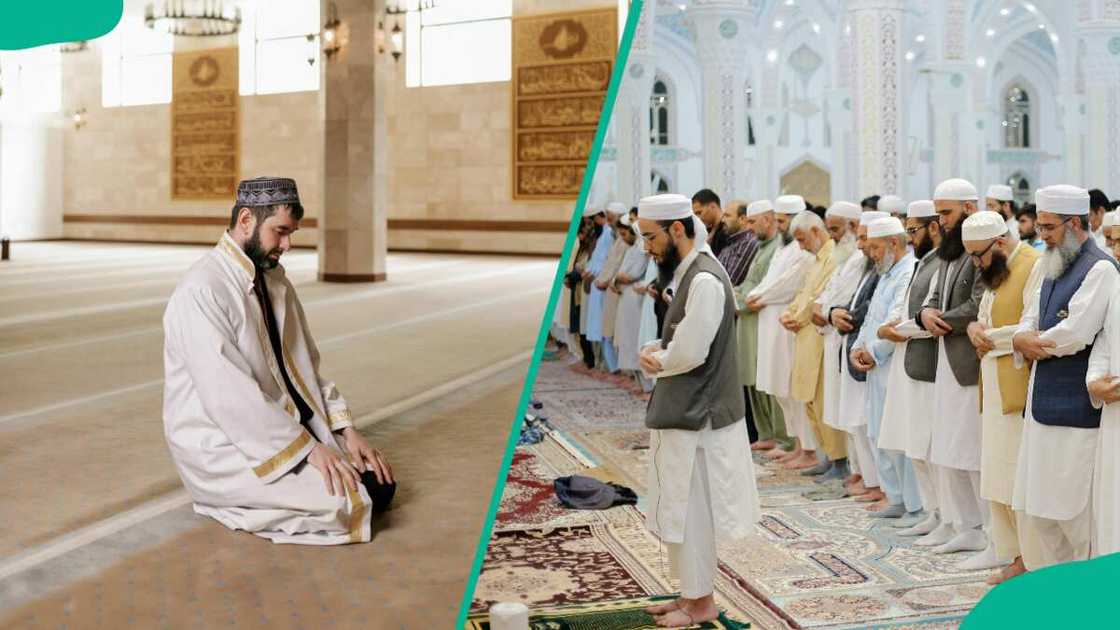
Source: UGC
When is Eid al-Adha in Nigeria?
The Nigerian government declared public holidays on Monday, June 17th, and Tuesday, June 18th, 2024, to mark the Eid al-Adha celebration.
When is Eid al-Adha in 2025?
Eid al-Adha in 2025 is expected to begin on the evening of Friday, June 6, and continue through Saturday, June 7. This date aligns with the 10th day of Dhu al-Hijjah, the final month of the Islamic lunar calendar.
10 sentences on Eid al-Adha
- Eid al-Adha, also known as the "Festival of Sacrifice," is one of the most important Islamic celebrations observed by Muslims worldwide.
- It commemorates the willingness of Prophet Ibrahim (Abraham) to sacrifice his son in obedience to God's command.
- The festival begins with a special congregational prayer known as Salat al-Eid, followed by a sermon.
- One of the central rituals of Eid al-Adha is the sacrifice of a halal animal, known as Qurbani.
- The meat from the sacrificed animal is divided into three portions — one for the family, one for friends and relatives, and one for the less fortunate.
- Muslims dress in new or freshly cleaned clothes on Eid al-Adha, symbolising purity and joy.
- Families and friends gather to share festive meals, exchange gifts, and strengthen social bonds.
- Charity is an essential aspect of Eid al-Adha, as Muslims are encouraged to help the needy and give Sadaqah (voluntary charity).
- The celebration also involves the recitation of Takbir (praising Allah) from the eve of Eid until the last day.
- Eid al-Adha is a time of spiritual reflection, gratitude, and the practice of compassion towards others.
While most Muslims observe Eid al-Adha rules for prayers and animal sacrifices, non-Muslim guests are not compelled to obey all the regulations. Nonetheless, it is appropriate to remember and respect their traditions when attending such festivals.
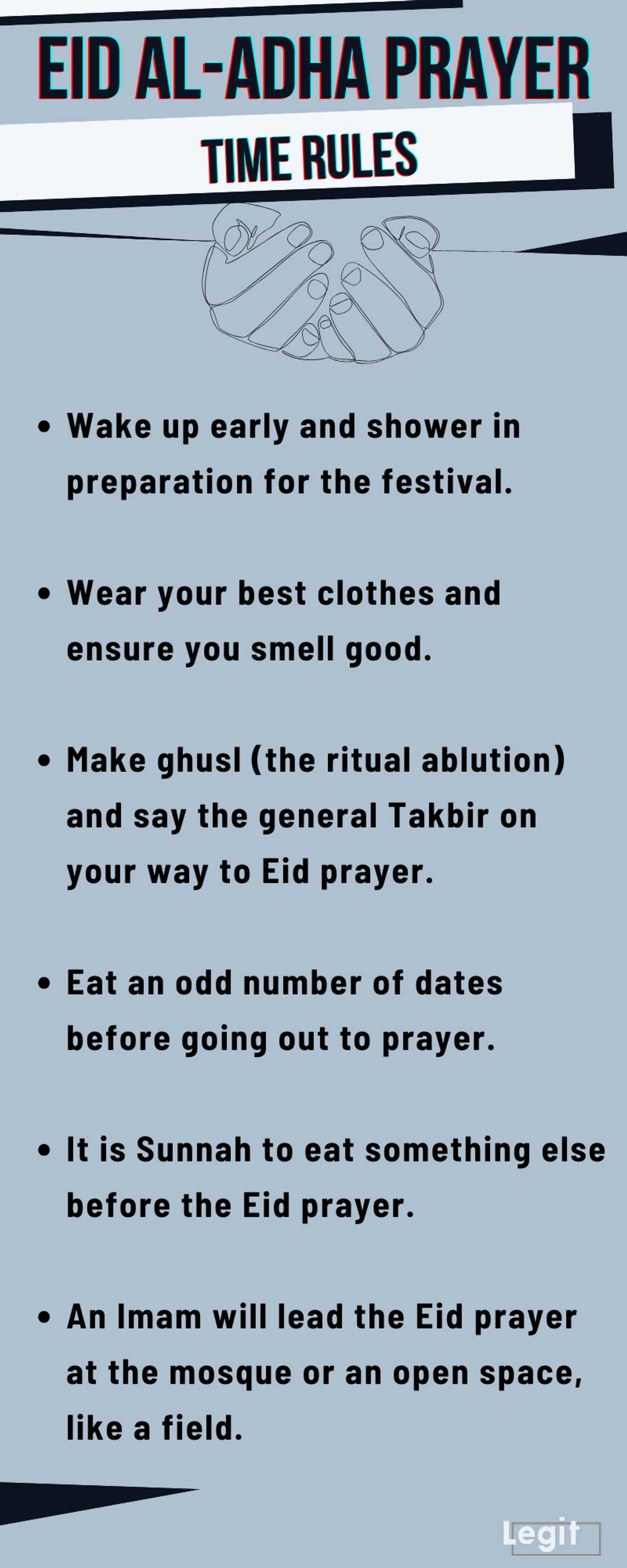
Source: Original
Legit.ng also shared the history of Ramadan. With a rich history that dates back to 610 AD, the holy month of Ramadan has been the most sacred period for Muslims for centuries.
The Quran was revealed during Ramadan to give humanity a clear guidance structure and a standard to differentiate right from wrong.
Source: Legit.ng

Peris Walubengo (Lifestyle writer) Peris Walubengo has vast experience in search engine optimization through digital content generation, research, editing, and proofreading. She joined Legit.ng in April 2022 and completed the AFP course on Digital Investigation Techniques. You can email her at perisrodah254@gmail.com.

Adrianna Simwa (Lifestyle writer) Adrianna Simwa is a content writer at Legit.ng where she has worked since mid-2022. She has written for many periodicals on a variety of subjects, including news, celebrities, and lifestyle, for more than three years. She has worked for The Hoth, The Standard Group and Triple P Media. Adrianna graduated from Nairobi University with a Bachelor of Fine Arts (BFA) in 2020. In 2023, Simwa finished the AFP course on Digital Investigation Techniques. You can reach her through her email: adriannasimwa@gmail.com


